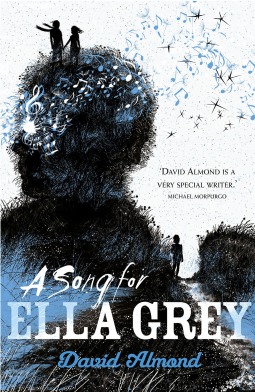A modern retelling of the Orpheus and Eurydice myth, “A Song for Ella Grey” does a decent job of presenting the myth to a young adult audience in a contemporary setting. However, Almond takes a gigantic risk in utilizing a strong north English dialect for the characters’ speech; a risk that ultimately fails as it the effect quickly tires for non north English readers.
The beginning part of the book is by far the strongest point. Almond hooks readers in immediately, informing us that there will be two deaths. He then gives us the fulcrum of the novella, one of the confirmed dead running away with a boy she’s never met in person before. With those two tidbits provided, the focus then switches back to the beginning as he has the narrator, Claire, begin to unwind the events that led to the demise of Ella.
Were this a simple, straightforward contemporary retelling, “A Song for Ella Grey” may have been fantastic, and would definitely have received more than the two star rating I’m giving it. Even with the dialect writing, the story of Ella and Orpheus was done well. Unfortunately, Almond splices through the myth with large sections of existentialist ramblings that detract from the main theme, the main story, and only work at boring the reader. I’m all for existential crises, but I don’t want to reread the same issues of self awareness every few pages when I am supposed to be reading a simple retelling. Especially when the two halves of the book, the myth and the existentialism, never seem to connect or even highlight one another. I was incredibly tempted to give “A Song for Ella Grey” a one star rating, but my love for the myth bumped it up to two. I also do think that there are some that would enjoy the novella, but mostly that would be a small niche audience of fifteen year olds in North England.
Share this:
- Click to share on Facebook (Opens in new window) Facebook
- Click to share on X (Opens in new window) X
- More
- Click to share on Reddit (Opens in new window) Reddit
- Click to share on X (Opens in new window) X
- Click to share on Tumblr (Opens in new window) Tumblr
- Click to share on Pinterest (Opens in new window) Pinterest
- Click to share on Pocket (Opens in new window) Pocket
- Click to share on Telegram (Opens in new window) Telegram
- Click to share on WhatsApp (Opens in new window) WhatsApp
- Click to share on Mastodon (Opens in new window) Mastodon

 A Song for Ella Grey by
A Song for Ella Grey by 






